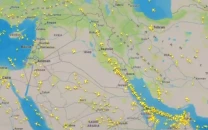Palestine: the erosion of two-state solution
Surely, the shift from Two to a One-State solution is a matter of utter shame for the entire world

The writer is former Dean Faculty of Social Sciences, University of Karachi and can be reached at amoonis@hotmail.com
The logical conclusion of the Israeli occupation of West Bank during the June 1967 Arab-Israeli war is now a foregone reality. The Palestinian majority territory of West Bank, which was controlled by Jordan before the war, will be annexed by Prime Minister Benjamin Netanyahu’s regime in July this year, in violation of UNSC resolutions. Fully supported by the Trump administration but vehemently opposed by the international community, particularly the European Union, Israel after establishing hundreds of Jewish settlements in the occupied West Bank has succeeded in rendering the Palestinian community an insignificant entity.
The predictable annexation will be a great human tragedy as Arab countries neither possess the political will nor the capability to prevent Israel from implementing its age-old plan of taking control of what it calls Judea and Samaria. Like India, which has taken advantage of the global pandemic to absorb the Muslim-majority Kashmir, Israel is pursuing a policy of brutally suppressing the Palestinian population and rendering it homeless by settling around half a million Jewish inhabitants. This will not only kill the ‘Two-State solution’ but also cause a grave threat to peace in the Middle East.
The Two-State solution, as supported by then US president George Bush, was an endorsement of the UN partition plan of Palestine in 1947. That plan called for the creation of a Jewish state, Israel, along with a Palestinian state. Although, Arab states and later the Palestinian Liberation Organization (PLO) rejected the plan and called for the destruction of Israel, it was evidently clear that the very state of Israel had come to stay and cannot be eliminated by mere rhetoric, threats and slogans. It was only after consecutive failures of the PLO in accomplishing its objective to seek a Palestinian state in Israel properly and the letting down of their cause by Arab states that the PLO agreed to recognise Israel and demanded an independent Palestinian state in the West Bank and Gaza in the 1990s. The September 1993 Oslo Accords mediated by US president Bill Clinton was a major breakthrough as the PLO and Israel granted mutual recognition, and a Palestinian state composed of West Bank and Gaza was agreed upon after sorting out unresolved issues of Jerusalem, return of Palestinian refugees and finality of borders by 1999.
Unfortunately, with the assassination of Israeli PM Yitzhak Rabin by a fanatic Jew in November 1995, and the victory of the ultra-right Likud party of Netanyahu led to the collapse of the Oslo process. Israel, which had agreed for a Two-State solution reneged from its position and augmented the process of Jewish settlements in the occupied West Bank. The shifting of its capital from Tel Aviv to Jerusalem despite international reservations and the blockade of Gaza further diluted prospects for a Two-State solution.
The current Israeli policy of annexing a major chunk of West Bank by July 1 needs to be analysed by taking into account three major realities. First, King Abdullah II of Jordan may have expressed his resentment against the planned annexation of the West Bank and Jordan Valley, but his country may not cancel its 1994 peace treaty with the Jewish state because of Amman’s heavy dependence on the US. Jordan, which has a huge Palestinian refugee population, was blamed for massacring thousands of them during the King Hussain’s reign. Called Black September of 1970, the PLO, which was accused of creating a state within a state, was expelled. Now, 50 years after the tragic episode, Jordan is trying to assert its position vis-a-vis Israel when the Jordanian monarch said, “I don’t want to make threats and create an atmosphere of loggerheads, but we are considering all options.” Like Egypt, Jordan has lost an opportunity to exert pressure on Israel to dismantle illegal Jewish settlements and annul its annexation plans by signing a peace treaty with Israel without seeking a final settlement of the Palestinian issue.
Second is the sad reality that the PLO, which would fight for the liberation of Palestine, is passing through a very difficult phase. Gaza, a Palestinian territory besieged by Israel from land and sea, is controlled by Hamas, a religious militant organisation and a rival of the PLO. Whereas, the Palestinian Authority is led by the PLO and controls the West Bank. Infighting within the community provided enough space to Israel to further inundate occupied West Bank with Jewish settlements. Taking advantage of intra-Palestinian schism and the indifference of its Arab neighbours, Netanyahu’s regime made a policy decision to annex the Jewish settlements of West Bank, Jerusalem and Jordan valley.
The EU, while condemning the planned annexation of West Bank by Israel, is however unable to take punitive measures against the Jewish state like the imposition of sanctions. EU Foreign Policy Chief Josep Borrell made it clear that the bloc will have to reach consensus on how to respond to the announced annexation of more than 40% of the West Bank.
Third, although Israel is currently passing through a domestic political crisis, it has managed to form a national unity coalition government comprising Netanyahu from the Likud party and former military chief Benny Gantz of the Blue and White Alliance. Even then the new Israeli government will go ahead with the implementation of the annexation plan. Unlike the Palestinians and their Arab counterparts, Israeli political parties are united as far as retaining Jewish settlements and denying an independent viable Palestinian state is concerned. The Labor party of Israel which for years had been a major political force and had, in September 1993 under its PM Rabin, signed a peace deal with the PLO, is in a shambles and has lost its electoral clout.
The erosion of the PLO and the division within the Palestinian community with the rise of Hamas jeopardised its bargaining strength with Israel. As a result, Israel has been able to get away with war crimes and serious violations of the UN Charter. Together with the Trump administration, it is confident that it will be able to implement its annexation plan and eliminate the possibility of an independent Palestinian state with its capital in East Jerusalem. The failure of the Palestinian state to emerge despite the UN partition plan of 1947 can certainly be termed as a man-made tragedy.
The erosion of the Two-State solution provides a fundamental lesson that without unity and perseverance of leadership, a just cause can meet an unfortunate fate. The demand for a viable Palestinian state with East Jerusalem as its capital is legitimate, but the way Arab states have let down their Palestinian counterparts and fragmentation within the Palestinian community enabled Israel to forcibly annex Golan Heights, and parts of West Bank, including the holy city of Jerusalem.
Surely, the shift from Two to a One-State solution is a matter of utter shame for the entire world, particularly the Arab countries, because it is an end to a just cause.
Published in The Express Tribune, May 22nd, 2020.
Like Opinion & Editorial on Facebook, follow @ETOpEd on Twitter to receive all updates on all our daily pieces.














COMMENTS
Comments are moderated and generally will be posted if they are on-topic and not abusive.
For more information, please see our Comments FAQ